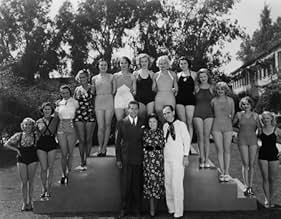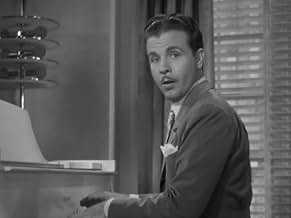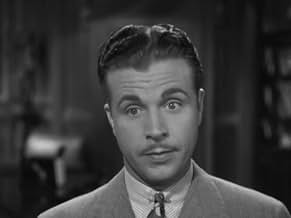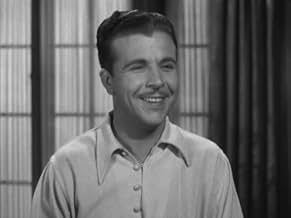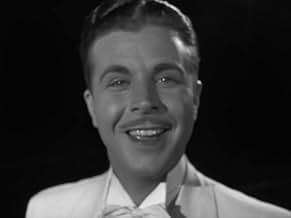IMDb-BEWERTUNG
6,4/10
1298
IHRE BEWERTUNG
Füge eine Handlung in deiner Sprache hinzuWhen two investors inform an opportunistic dancer that they can't fund an elderly stage producer's production, she suggests they get an insurance policy on the producer's life.When two investors inform an opportunistic dancer that they can't fund an elderly stage producer's production, she suggests they get an insurance policy on the producer's life.When two investors inform an opportunistic dancer that they can't fund an elderly stage producer's production, she suggests they get an insurance policy on the producer's life.
- Für 1 Oscar nominiert
- 2 Gewinne & 1 Nominierung insgesamt
Charles D. Brown
- Hugo
- (as Chas. D. Brown)
William B. Davidson
- Andy Callahan
- (as Wm. Davidson)
Bobbie Adams
- Chorus Girl
- (Nicht genannt)
Iris Adrian
- Verna
- (Nicht genannt)
Empfohlene Bewertungen
Busby Berkeley musicals are always great fun to watch regardless of the storyline because of the outstanding musical sequences. Berkeley's Gold Diggers series contains some of the most exciting. Gold Diggers of 1937 is possibly the worst of the lot, but it still isn't bad. With a great cast and an interesting finale, this film is a must for fans of early musicals.
Dick Powell stars as an insurance salesman with a terrible record. He bumps into Joan Blondell on a train one day and finds his luck steadily increasing from there. Soon, he gets a client (Victor Moore) to open a million dollar insurance policy, which makes him begin to hear wedding bells. However, his client is not very young, nor is he very healthy. His business partners are counting on this. They've gambled his fortune away and now have no other way to cover their backs. With plotting from both sides, poor old Mr. Hobart is in for a heck of a ride.
Unfortunately, this film reads much more like the b-pictures that Powell and Blondell made during the slump in their careers than like the instant classics they were teamed up in at the beginning of their careers.
There are only a few songs used throughout this film, and none of them are as catchy as the ones from past installments. Still, they're created quite well visually. "Speaking of the Weather" features two stagings, the first in an office as a tet a tet between Powell and Blondell and the second at a big party. This version features an excellent tap routine. The big finale is "All is Fair in Love and War" which features a bevy of beautiful girls rocking in rocking chairs and bombing their beaus from across a largely black screen.
Dick Powell stars as an insurance salesman with a terrible record. He bumps into Joan Blondell on a train one day and finds his luck steadily increasing from there. Soon, he gets a client (Victor Moore) to open a million dollar insurance policy, which makes him begin to hear wedding bells. However, his client is not very young, nor is he very healthy. His business partners are counting on this. They've gambled his fortune away and now have no other way to cover their backs. With plotting from both sides, poor old Mr. Hobart is in for a heck of a ride.
Unfortunately, this film reads much more like the b-pictures that Powell and Blondell made during the slump in their careers than like the instant classics they were teamed up in at the beginning of their careers.
There are only a few songs used throughout this film, and none of them are as catchy as the ones from past installments. Still, they're created quite well visually. "Speaking of the Weather" features two stagings, the first in an office as a tet a tet between Powell and Blondell and the second at a big party. This version features an excellent tap routine. The big finale is "All is Fair in Love and War" which features a bevy of beautiful girls rocking in rocking chairs and bombing their beaus from across a largely black screen.
...from Warner Brothers/First National, director Lloyd Bacon, and dance choreographer/director Busby Berkeley. A group of showgirls, including Norma (Joan Blondell) and Genevieve (Glenda Farrell), grow tired of struggling with poverty, so they set out to change their circumstances. Norma meets insurance salesman Rosmer Peak (Dick Powell), and he gets her a job at his firm. Genevieve falls in with shady theatrical bookkeeper Morty (Osgood Perkins) who's trying to get out from under the debt of theater owner J.J. Hobart (Victor Moore), and who concocts a plan that brings them into contact with Rosmer and Norma.
The musical format had started to change in cinema by this point. Whereas previous films had largely kept musical numbers confined to the stage on which they were ostensibly being shown to the "audience" within the film's narrative, now more and more songs were being performed out "in the world", with characters breaking out into song while walking down the street or sitting in a park. Berkeley's only major number comes at the very end, an elaborate fantasia that is supposedly being viewed by a theater audience but actual defies all physics of reality. It's interesting to look at, but isn't terribly inspired. Dixon, who I'm unfamiliar with, gets a couple of tap-dancing showcases, including one on a giant rocking chair seat. I enjoyed Moore, and I always welcome Blondell and Farrell, but the movie is only passable. Berkeley earned an Oscar nomination for Best Dance Direction. Look out for Carole Landis and Jane Wyman among the chorus girls.
The musical format had started to change in cinema by this point. Whereas previous films had largely kept musical numbers confined to the stage on which they were ostensibly being shown to the "audience" within the film's narrative, now more and more songs were being performed out "in the world", with characters breaking out into song while walking down the street or sitting in a park. Berkeley's only major number comes at the very end, an elaborate fantasia that is supposedly being viewed by a theater audience but actual defies all physics of reality. It's interesting to look at, but isn't terribly inspired. Dixon, who I'm unfamiliar with, gets a couple of tap-dancing showcases, including one on a giant rocking chair seat. I enjoyed Moore, and I always welcome Blondell and Farrell, but the movie is only passable. Berkeley earned an Oscar nomination for Best Dance Direction. Look out for Carole Landis and Jane Wyman among the chorus girls.
Dick Powell is an insurance salesman who sells a million dollar policy to a producer in "Gold Diggers of 1937" also starring Joan Blondell, Victor Moore, Osgood Perkins and Glenda Farrell.
Due to bad investments by his staff, producer/hypochondriac Hobart (Moore) has no idea that the show he's planning to put on can't be financed. The men responsible for losing his money get Rosmer (Powell), an insurance salesman, to sell Hobart a $1 million policy, figuring he won't live and then the show can be done.
The funniest part of the movie is when Rosmer tells his fellow insurance salesmen of his coup and then announces that Hobart is 59. "59!" one of them exclaims. "He'll never pass the physical." "We sold a policy to a 68-year-old last year," someone says, "and he passed." "Yeah," the reply is, "passed OUT."
Interesting that 59 was thought of as more than 79 in the '30s. Coincidentally, Dick Powell himself died at the age of 59.
It's Rosmer's job to keep Hobart alive and it's his partners' job to help him to the pearly gates. They send in Glenda Farrell to break his heart, figuring he'll want to end it all, but things don't work out as they planned.
They throw him in a pool at a party; he doesn't catch cold, nor does he drown. It's actually pretty funny.
There are some pleasant songs which Powell sings beautifully, and a big Busby Berkeley number at the end, but I imagine as this is part of a series of "Gold Digger" films, audiences wanted something more.
The performances are good - chameleon Powell is a great, earnest salesman, Joan Blondell (who was either Powell's wife or about to become his wife) is adorable as a showgirl, and Moore is hilarious. Glenda Farrell is a real scene-stealer with her great line delivery.
Pleasant but not much as far as musical values.
Due to bad investments by his staff, producer/hypochondriac Hobart (Moore) has no idea that the show he's planning to put on can't be financed. The men responsible for losing his money get Rosmer (Powell), an insurance salesman, to sell Hobart a $1 million policy, figuring he won't live and then the show can be done.
The funniest part of the movie is when Rosmer tells his fellow insurance salesmen of his coup and then announces that Hobart is 59. "59!" one of them exclaims. "He'll never pass the physical." "We sold a policy to a 68-year-old last year," someone says, "and he passed." "Yeah," the reply is, "passed OUT."
Interesting that 59 was thought of as more than 79 in the '30s. Coincidentally, Dick Powell himself died at the age of 59.
It's Rosmer's job to keep Hobart alive and it's his partners' job to help him to the pearly gates. They send in Glenda Farrell to break his heart, figuring he'll want to end it all, but things don't work out as they planned.
They throw him in a pool at a party; he doesn't catch cold, nor does he drown. It's actually pretty funny.
There are some pleasant songs which Powell sings beautifully, and a big Busby Berkeley number at the end, but I imagine as this is part of a series of "Gold Digger" films, audiences wanted something more.
The performances are good - chameleon Powell is a great, earnest salesman, Joan Blondell (who was either Powell's wife or about to become his wife) is adorable as a showgirl, and Moore is hilarious. Glenda Farrell is a real scene-stealer with her great line delivery.
Pleasant but not much as far as musical values.
Gold Diggers of 1933 was a terrific film with some of Busby Berkeley's best material. Gold Diggers of 1935 was almost as good too, but this was a little disappointing. Apart from the cracking final number All's Fair in Love and War Berkeley's choreography lacks excitement and has a rather toned down feeling to it(censorship no doubt had something to do with it). While it still looks quite nice, it's nicely shot and the costumes are well-tailored, there is also a sense with the less-than-grand sets and how some scenes are staged that there was a lack of budget. Dick Powell sings beautifully and has a charming appearance but can have a tendency to be a little too sappy and wooden here. The songs are very nice and catchy still, Speaking of the Weather is charming and All's Fair in Love and War is catchy and in all respects the highlight of the film. There's plenty of snappy dialogue to savour also, and while with some silly moments the plot is actually pretty decent and paced well. The performances compliment the film nicely, Victor Moore is very funny and wonderfully cranky, Joan Blondell still charms even when in more subdued mode and Glenda Farrell is deliciously sassy, coming this close to stealing the film whenever she appears. All in all, disappointing but still enjoyable. 7/10 Bethany Cox
The snappy dialogue and pace of Berkeley's previous films are not to be found here--GD of '37 feels more like a Republic musical than a Warners one. The bankroll went to the one big Berkeley number at the end--"All Is Fair In Love and War." It's a simple piece, lines of chorus girls dressed in white against a shiny black floor, but it is simply astonishing (the song is pretty catchy too). There is also a nice little number with Powell and Blondell called "Speaking of The Weather"--an interesting attempt to seamlessly integrate a musical number into the plot. Among the mistakes (besides the script) is the short-shrift given to the best, most popular song in the film--"With Plenty of Money and You."
Wusstest du schon
- WissenswertesMultiple references to 'carloadings' being up, meaning an increase in the total amount of goods shipped by railroad. Back before stores and other businesses reported total monthly sales, carloadings was the best available measure of consumer spending.
- Patzer(at around 20 min) A string used to make a stack of books fall onto Dick Powell's head is clearly visible against the white paper background.
- Zitate
Rosmer Peak: Would you call Andy if I kiss you?
Norma Perry: Not unless you want to kiss him too.
- Crazy CreditsThe usual disclaimer goes to great lengths to assure us that "The names of all characters -- The characters themselves -- The story - all incidents and institutions portrayed in this production are fictitious -- And no identification with actual persons, living or deceased, is intended or should be inferred."
- Alternative VersionenThere is an Italian edition of this film on DVD, distributed by DNA srl, "VIVA LE DONNE! (1933) + AMORE IN OTTO LEZIONI (1936)" (2 Films on a single DVD), re-edited with the contribution of film historian Riccardo Cusin. This version is also available for streaming on some platforms.
- VerbindungenEdited into Busby Berkeley and the Gold Diggers (1969)
- SoundtracksWith Plenty of Money and You
(1936)
Music by Harry Warren
Lyrics by Al Dubin
Sung by Dick Powell (uncredited)
Top-Auswahl
Melde dich zum Bewerten an und greife auf die Watchlist für personalisierte Empfehlungen zu.
- How long is Gold Diggers of 1937?Powered by Alexa
Details
- Erscheinungsdatum
- Herkunftsland
- Sprache
- Auch bekannt als
- Vampiresas 1937
- Drehorte
- Produktionsfirma
- Weitere beteiligte Unternehmen bei IMDbPro anzeigen
- Laufzeit1 Stunde 41 Minuten
- Farbe
- Sound-Mix
- Seitenverhältnis
- 1.37 : 1
Zu dieser Seite beitragen
Bearbeitung vorschlagen oder fehlenden Inhalt hinzufügen

Oberste Lücke
By what name was Gold Diggers of 1937 (1936) officially released in India in English?
Antwort

